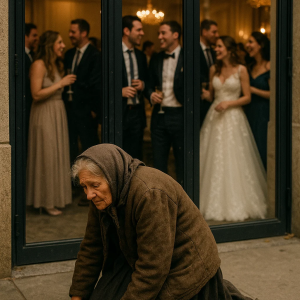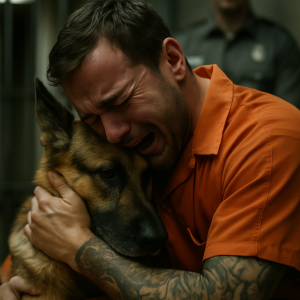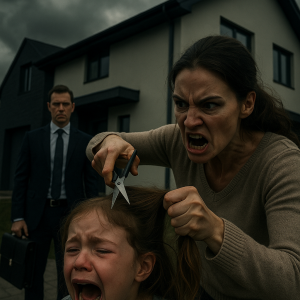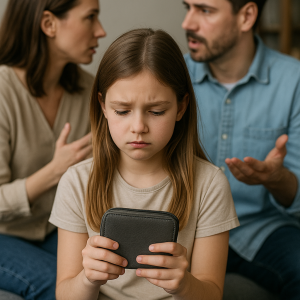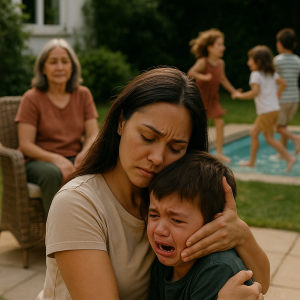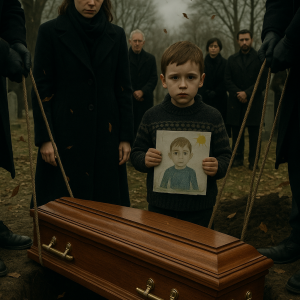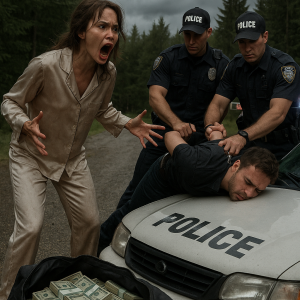I lived alone, struggling through hardship, yet I still borrowed money to raise an abandoned child I had never known
I had always lived alone. My days blurred into one another—lean harvests, aching bones, and the endless struggle of survival in a remote, poverty-stricken village. I had no husband to lean on, no children to comfort me, no relatives to call family. My world was measured by the furrows of rice fields, the calluses on my palms, and the constant tightening of my belt to make ends meet.
But on a stormy night, the course of my life shifted forever.
The rain poured down in sheets, thunder rattling the sky as if it meant to split the heavens open. I had sought shelter by the gates of the old temple, its wooden beams creaking under the weight of the storm. That’s when I heard it—an infant’s cry, faint and desperate, nearly lost to the roar of the rain.
My eyes darted to the temple’s steps. There, lying in a bundle, was a newborn. His skin was flushed pink from the cold, his tiny limbs kicking weakly. He was wrapped in nothing but a thin, rain-soaked cloth, barely enough to shield him from the night’s cruelty.
I looked around, heart pounding. Surely, someone must come back for him—a frantic mother, a regretful father, anyone at all. But no one came.
The rain showed no mercy. The baby cried harder.
And so I stepped forward. I bent down, my hands trembling as I gathered him into my arms. He was so small, so fragile, yet warm against my chest.
“Alright, little one,” I whispered over the storm, holding him close. “You’re not alone anymore.”
That night, I carried him home. I named him Daniel Miller—hoping he would grow wise and strong, like someone destined to rise above the suffering he was born into.
Raising Daniel was both my greatest burden and my greatest blessing. I was no blood relative, just an old woman scraping by. But I worked harder than ever, taking on any labor I could find. I borrowed money from neighbors, and when that wasn’t enough, I went to the policy bank.
There were nights I ate nothing but watery rice porridge, my stomach hollow and aching, so that Daniel could have a box of milk or a clean notebook like the other children. The villagers gossiped, some calling me foolish for sacrificing so much for a child who wasn’t even mine. But I ignored them.

Because Daniel was worth it.
He grew into a quiet, intelligent boy—gentle, obedient, always with a seriousness in his eyes beyond his years. He never called me “Mother.” Instead, he called me “Aunt.” At times, the word cut deep, a reminder of the bloodline we didn’t share. But I never let it show. Love isn’t bound by titles.
All I ever wanted was for him to study hard, to rise above the mud and hunger that had trapped me all my life.
When Daniel passed the university entrance exam, I thought my chest might burst with pride. I sold the few things I owned of value, mortgaged the creaking old house once more, and scraped together enough for his tuition.
The night before he left, he lowered his head, speaking in that soft, steady way of his.
“I’ll do my best, Auntie,” he said. “Please wait for me to return.”
And then he was gone.
But he never returned.
Four years passed. Then five. Not a single letter. Not a single phone call.
I asked around—his classmates, his teachers, anyone who might know him. But no one did. His phone number was disconnected. His address erased. It was as though Daniel Miller had vanished from the earth.
The silence hollowed me out. Each day without word from him felt like a stone pressed on my chest. But life allowed no time to grieve.
So I carried on. I hauled vegetables at the market by day. At night, I scavenged for scraps to sell. Slowly, painfully, I chipped away at the mountain of debt I had taken on to give him a chance at life.
The years wore me down. My back bent, my hands shook, my eyes dimmed with age. But still, I worked, clinging to the single promise I could keep—to settle the debts that tied me to the past.
At last, thirteen years after I had first borrowed that money, I made the slow walk back to the bank. My feet shuffled, my body weak, but my heart felt light with relief.
At the counter, I placed the worn folder of papers down.
“I’ve come to settle the final debt,” I told the clerk, my voice rasping. “I’ll pay off what’s left.”
The young woman nodded, tapping at her computer. Her brow furrowed.
“Please wait,” she said. “This loan… it was already settled. Two years ago.”
I blinked, confused. My lips quivered.
“What? No… that can’t be. Who paid it?”
The clerk scrolled, then read aloud, her voice careful and clear.
“Payment on behalf of my aunt—the only person who has ever loved me without condition. Sender: Daniel Miller.”
My body went weak. The folder slipped from my hands as I clutched the counter for support.
Daniel.
The boy I had raised, the boy I had believed lost to the world, had not forgotten me. He had carried my sacrifices with him. He had found a way—not with words, not with calls, but with action. Quiet, deliberate action.
My vision blurred with tears. They ran freely down my face as I stood there in the middle of the bank, too overwhelmed to speak.
It wasn’t bitterness that made me cry. It was the weight of understanding.
Daniel hadn’t abandoned me. He had only taken a different path, one I couldn’t see from my little village. He had remembered me, silently, as I had once carried him out of the storm.
And in that moment, this old heart finally understood: he had not been lost.
He had only been finding his own way back.

